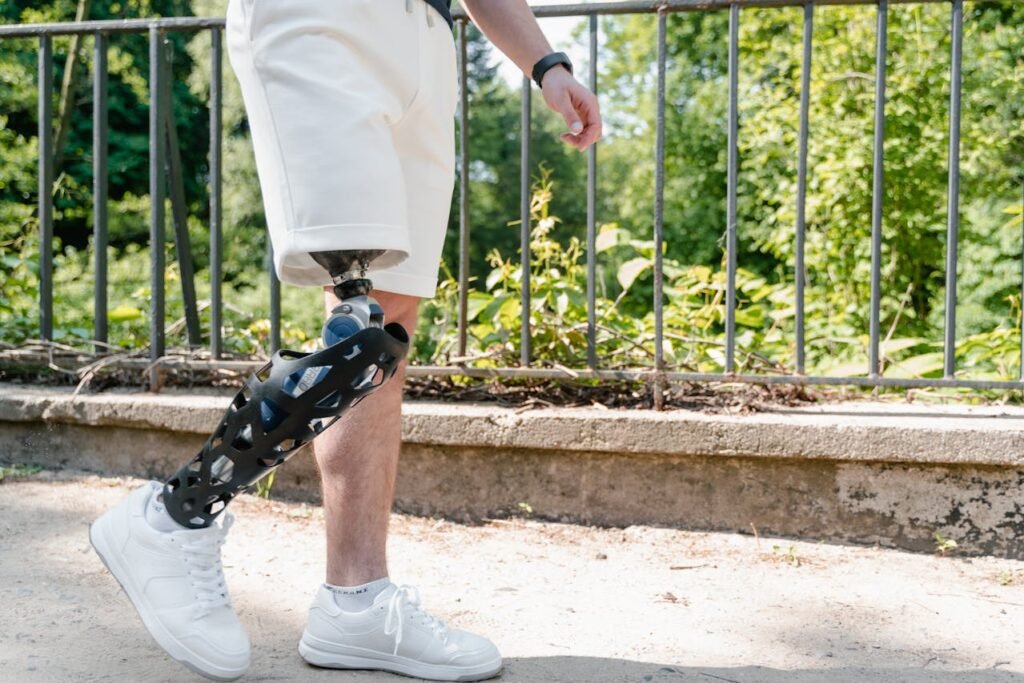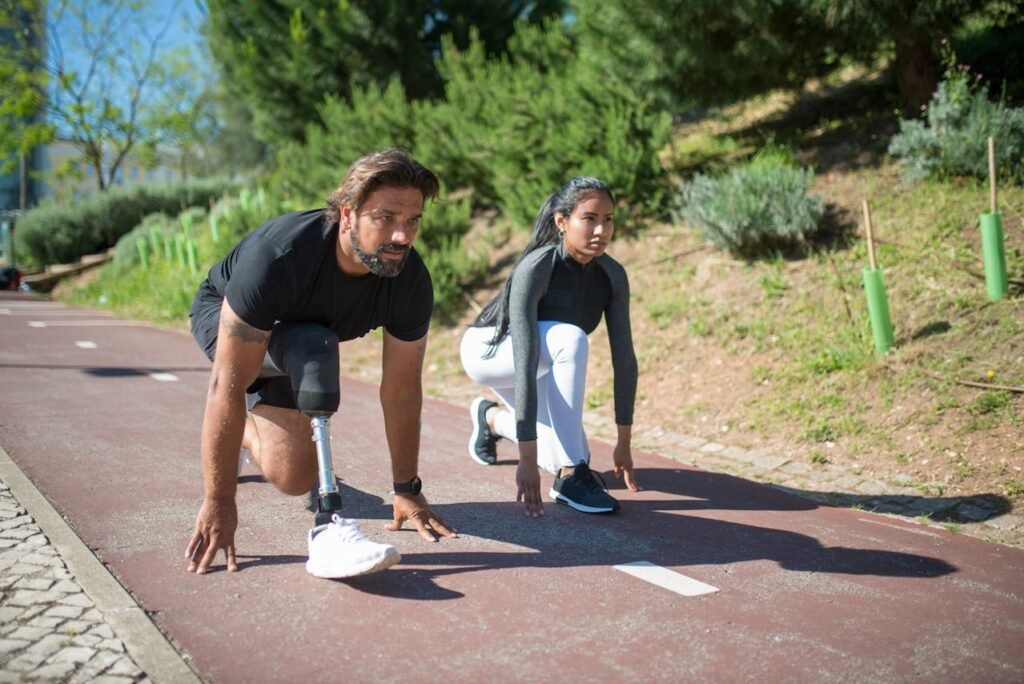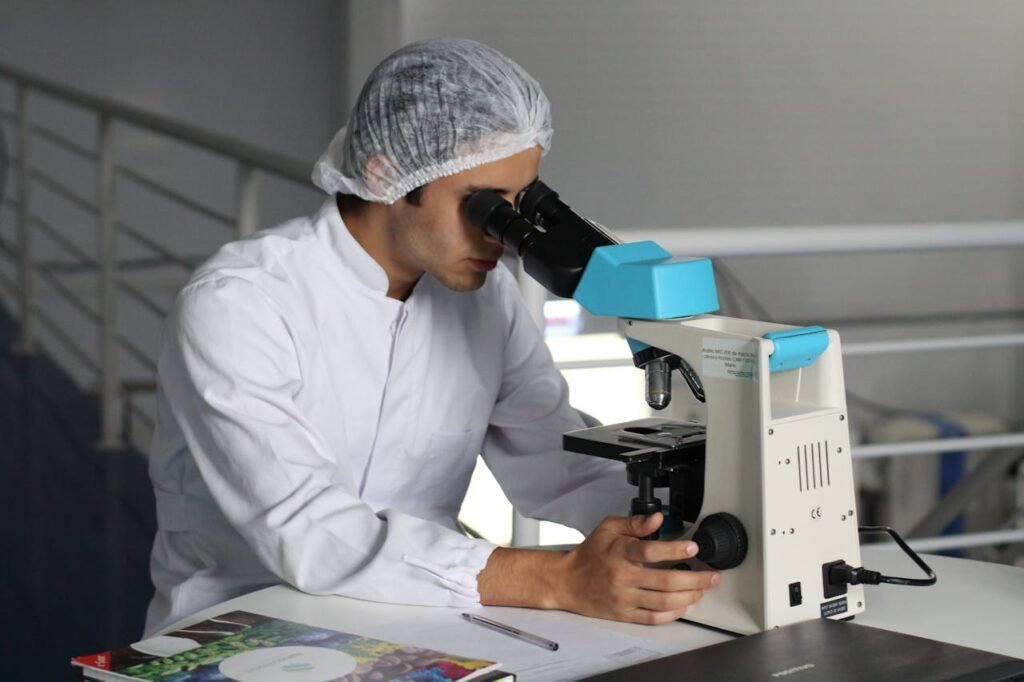For individuals with above-knee amputations, mobility often comes with challenges. Traditional prosthetics can restore function, but they rarely replicate the natural ease of movement or provide the confidence needed to tackle uneven terrain, slopes, or everyday obstacles. This is where microprocessor knees step in, revolutionizing mobility for amputees by combining advanced technology with human-centered design.
Microprocessor knees are not just prosthetic components—they are intelligent systems that adapt to the user’s movements, offering unparalleled stability, efficiency, and comfort. In this article, we explore what makes microprocessor knees so transformative, how they work, and why they are redefining life for amputees worldwide.
The Technology Behind Microprocessor Knees
Microprocessor knees (MPKs) represent a leap forward in prosthetic technology. Unlike traditional mechanical knees that rely on fixed settings or manual adjustments, MPKs are equipped with intelligent systems that adapt in real time to the user’s movement and environment.
Microprocessor Knees
At the heart of an MPK is a small, embedded microprocessor that acts as the “brain” of the device. This processor continuously collects and analyzes data from various sensors, including gyroscopes, accelerometers, and strain gauges. These sensors monitor parameters such as gait speed, angle of movement, and ground impact.
Using this data, the microprocessor adjusts the knee’s resistance and movement patterns almost instantly. Whether the user is walking on flat ground, climbing stairs, or navigating a slope, the MPK ensures smooth, natural movements tailored to the specific activity.

Powering the System
MPKs rely on rechargeable batteries to power their advanced systems. These batteries typically last for several days on a single charge, depending on the level of activity.
For businesses, ensuring efficient energy consumption and providing reliable charging solutions are critical to user satisfaction. Innovations like faster charging times or longer battery life can further enhance the appeal of MPKs.
Key Benefits of Microprocessor Knees
MPKs have changed the game for amputees by addressing some of the most significant challenges associated with traditional prosthetics. Their benefits go beyond functionality, impacting the physical, psychological, and social well-being of users.
Enhanced Stability and Safety
One of the most critical advantages of MPKs is their ability to prevent falls, a common concern for individuals with above-knee amputations. The knee’s sensors can detect sudden shifts in balance or uneven terrain, triggering an automatic adjustment to stabilize the user.
For example, if a user stumbles on a loose stone, the MPK’s sensors instantly detect the imbalance and lock the knee to prevent it from collapsing. This quick response significantly reduces the risk of injury and boosts the user’s confidence in navigating their environment.
Improved Energy Efficiency
Walking with a traditional prosthetic knee often requires more energy than walking with two biological legs. MPKs address this by optimizing movement patterns, reducing the effort needed to walk or climb stairs.
For users, this means less fatigue during daily activities, allowing them to focus on their goals rather than their mobility limitations. Businesses can emphasize this benefit in their marketing, highlighting how MPKs improve the quality of life for amputees.
Natural and Adaptive Movement
MPKs mimic the natural motion of the knee, offering a more lifelike walking experience. The device adapts to changes in speed, stride length, and terrain, making transitions seamless and intuitive.
For instance, when walking downhill, the MPK can automatically increase resistance to slow the user’s descent, preventing the jarring movements often associated with mechanical knees. This adaptability makes MPKs ideal for a wide range of activities, from casual strolls to rigorous outdoor adventures.
Transforming Lives: The Human Impact of Microprocessor Knees
Microprocessor knees (MPKs) are not just technological marvels—they are life-changing tools that restore independence and dignity to amputees. Their ability to provide stability, comfort, and adaptability helps users regain confidence in their daily lives, whether navigating bustling streets, playing with their children, or pursuing active hobbies.
Restoring Independence
For many amputees, reliance on others for mobility can feel restrictive. MPKs empower users to perform everyday tasks with confidence and ease, reducing their dependence on caregivers. Simple activities like carrying groceries, walking to a park, or climbing stairs independently become achievable milestones.
This newfound independence has a profound impact on mental health. Users often report feeling more capable and self-assured, which improves their overall well-being and fosters a sense of control over their lives.
Businesses can amplify this message by sharing real-life stories of individuals whose lives have been transformed by MPKs, creating an emotional connection with potential customers.
Expanding Activity Horizons
Traditional prosthetics can limit participation in physical activities, as they are not designed to handle dynamic movements or challenging terrains. MPKs change this narrative by enabling users to explore activities like hiking, dancing, or sports.
The adaptability of MPKs to different terrains and speeds allows users to participate in activities that were previously inaccessible. For instance, an amputee who enjoys hiking can confidently navigate uneven trails, knowing that their prosthetic knee will adjust to maintain balance and safety.
Businesses can engage with sports and fitness communities to demonstrate the versatility of MPKs. Sponsoring adaptive sports events or collaborating with athletes to showcase the capabilities of these devices can enhance visibility and inspire potential users.

Opportunities for Businesses in the MPK Market
The rapid adoption of microprocessor knees presents significant opportunities for prosthetic manufacturers, healthcare providers, and rehabilitation centers. By focusing on innovation, accessibility, and user support, businesses can position themselves as leaders in this transformative space.
Investing in Research and Development
Continuous innovation is essential to maintaining a competitive edge in the MPK market. Businesses should prioritize R&D efforts that enhance the functionality, efficiency, and affordability of these devices.
For example, exploring advancements in sensor technology can lead to even faster response times and more precise adjustments. Similarly, integrating artificial intelligence (AI) into MPKs can enable predictive adjustments, where the knee anticipates the user’s next movement based on learned patterns.
Collaborations with universities, tech firms, and biomechanics researchers can accelerate these developments. Offering internships or funding research programs not only drives innovation but also establishes the business as a thought leader in the industry.

Addressing Affordability and Accessibility
Despite their benefits, MPKs remain out of reach for many amputees due to high costs. Businesses have a unique opportunity to expand their market by developing cost-effective solutions without compromising quality.
One approach is to create tiered product lines, offering both premium and entry-level MPKs. Entry-level models can focus on essential features, while advanced models incorporate cutting-edge technology for users with specific needs or preferences.
Additionally, businesses can collaborate with non-profits and government agencies to provide financial assistance or subsidies for users who cannot afford MPKs. Establishing financing options, such as installment plans, makes these devices more accessible and demonstrates a commitment to inclusivity.
Enhancing User Education and Support
For many users, transitioning to an MPK involves a learning curve. Businesses can differentiate themselves by offering comprehensive education and support programs that help users adapt to their new devices.
Creating user-friendly guides, video tutorials, and in-person workshops can empower users to make the most of their MPKs. Providing access to rehabilitation specialists and peer support groups further enhances the experience, ensuring users feel confident and supported throughout their journey.
Businesses that invest in user education and long-term support build trust and loyalty, fostering stronger relationships with their customers.
Future Trends in Microprocessor Knees
The evolution of microprocessor knees (MPKs) is far from complete. Advances in technology and a growing focus on user-centered design are driving innovations that promise to make these devices even more efficient, intuitive, and accessible. For businesses, staying ahead of these trends is critical to maintaining relevance in a competitive market.
Integration of Artificial Intelligence
Artificial intelligence (AI) is poised to transform the functionality of MPKs by enabling predictive adjustments and continuous learning. Current MPKs already adapt to user movements in real time, but future models will leverage AI to anticipate actions before they occur.
For example, an AI-enabled MPK could analyze patterns in a user’s gait over time, learning when they are likely to transition from walking to running or when they need extra stability on uneven terrain. These predictive capabilities ensure smoother, more intuitive movement, reducing the mental effort required to use the device.
Businesses that integrate AI into their MPK designs should focus on seamless user interfaces and personalization. Providing mobile apps or web portals that allow users to customize their prosthetics enhances engagement and ensures that the device evolves with the user’s needs.

Advances in Energy Efficiency
Energy consumption remains a key consideration for MPKs, especially as users demand longer battery life and faster charging solutions. Emerging trends in battery technology, such as solid-state batteries and energy harvesting systems, are set to address these challenges.
For instance, kinetic energy systems could allow MPKs to recharge themselves as users walk, eliminating the need for frequent recharging and enhancing convenience. Similarly, integrating solar panels into the prosthetic’s design could provide supplementary power during outdoor activities.
Businesses investing in energy-efficient technologies not only improve user satisfaction but also align with global sustainability goals. Highlighting these innovations in marketing materials reinforces the brand’s commitment to advancing both technology and environmental responsibility.
Enhanced Connectivity and Ecosystem Integration
The future of MPKs extends beyond the device itself. Connectivity features that integrate the prosthetic with other smart devices are becoming increasingly important to users.
Imagine an MPK that syncs with a fitness tracker to provide detailed data on steps taken, calories burned, and distance covered. Rehabilitation centers could also use cloud-based platforms to monitor a user’s progress remotely, making adjustments to the prosthetic’s settings as needed.
For businesses, creating an ecosystem around MPKs opens new revenue streams and strengthens customer loyalty. Offering subscription services for advanced analytics or remote support ensures ongoing engagement and provides added value for users.
The Role of MPKs in Rehabilitation
Rehabilitation is a crucial phase for amputees transitioning to life with a prosthetic, and MPKs play an integral role in this process. By improving mobility, stability, and confidence, MPKs enhance the effectiveness of rehabilitation programs and accelerate recovery.
Supporting Physical Rehabilitation
Physical rehabilitation focuses on helping users regain strength, balance, and coordination. MPKs, with their ability to adjust resistance and adapt to uneven terrain, make it easier for users to perform exercises and build muscle memory.
For example, during gait training, an MPK can provide just the right amount of resistance to simulate a natural walking experience. This precise control reduces strain on other parts of the body and prevents compensatory movements that could lead to long-term issues.
Rehabilitation centers and businesses can collaborate to develop MPK-specific training protocols, ensuring users get the most out of their devices. Offering co-branded programs or workshops positions businesses as active partners in the recovery journey.
Facilitating Mental and Emotional Adjustment
Adapting to a prosthetic is as much a psychological process as it is a physical one. MPKs, with their intuitive design and life-like movement, help users regain confidence and reduce the stigma often associated with limb loss.
For many users, the ability to move naturally and participate in activities they once enjoyed is a powerful motivator. Businesses can emphasize this emotional impact in their outreach efforts, showcasing how MPKs restore not just mobility but also a sense of normalcy and independence.
Long-Term Support and Monitoring
The relationship between a user and their MPK doesn’t end after the initial fitting. Long-term support is essential to ensuring the prosthetic continues to meet the user’s needs as they evolve.
Businesses can enhance this support by offering regular check-ins, either in person or remotely, to monitor the device’s performance and make necessary adjustments. Providing software updates that improve functionality or introduce new features ensures that users always have access to the latest advancements.
Addressing Accessibility Challenges
While microprocessor knees (MPKs) offer life-changing benefits, their accessibility remains a significant challenge. The high cost of these devices, combined with limited availability in certain regions, often prevents many amputees from experiencing their advantages. Businesses have a crucial role to play in bridging this gap by developing strategies that make MPKs more affordable and widely available.
Lowering Manufacturing Costs
One of the primary drivers of MPK costs is the complexity of manufacturing. Businesses can address this by adopting cost-efficient production techniques, such as additive manufacturing (3D printing).
This technology allows for the precise creation of complex components with minimal material waste, reducing production expenses without compromising quality.
Additionally, streamlining supply chains and sourcing components locally can further reduce costs. By building partnerships with local suppliers, businesses can minimize transportation expenses and support regional economies, making their products more affordable and socially responsible.

Expanding Global Reach
In many parts of the world, access to advanced prosthetics like MPKs is limited by inadequate distribution networks and a lack of trained professionals to fit and maintain the devices. Businesses must invest in expanding their reach to underserved regions, ensuring that amputees worldwide can benefit from this technology.
Establishing partnerships with healthcare providers, rehabilitation centers, and non-governmental organizations (NGOs) is a strategic way to enter new markets. Training local clinicians in the fitting and maintenance of MPKs ensures that users receive high-quality care and support, even in remote areas.
To further enhance accessibility, businesses can offer mobile clinics or telehealth services that bring expertise directly to users. These initiatives not only increase reach but also demonstrate a commitment to inclusivity and user satisfaction.
Offering Financial Solutions
Affordability is a significant barrier for many amputees considering an MPK. Businesses can address this challenge by offering flexible financing options, such as installment plans or leasing models. These solutions allow users to spread the cost of their prosthetic over time, making it more manageable.
Another approach is to collaborate with insurance providers to include MPKs in coverage plans. Businesses can also work with government agencies to advocate for subsidies or reimbursement programs that reduce the financial burden on users.
By proactively addressing affordability, businesses expand their customer base and create a reputation for accessibility and compassion.
Looking Ahead: The Future of Microprocessor Knees
The future of MPKs is filled with promise, driven by rapid advancements in technology and a growing emphasis on user-centered design. As these devices continue to evolve, they will not only become more advanced but also more accessible, bridging the gap between innovation and inclusivity.
Toward Fully Integrated Prosthetics
The integration of MPKs with other prosthetic technologies is a key trend to watch. Future designs may include seamless communication between the knee joint, foot, and even upper-limb components, creating a fully integrated system that mimics the functionality of a natural limb.
For example, sensors in the foot could relay ground conditions to the knee, allowing for even more precise adjustments. Similarly, coordination with upper-limb prosthetics could improve balance and movement for users who have multiple amputations.
Businesses that focus on interoperability and system integration will lead the charge in creating holistic solutions that redefine prosthetic mobility.
Sustainability in MPK Design
As global awareness of environmental issues grows, sustainability will play a larger role in MPK design and manufacturing. Businesses can adopt eco-friendly practices, such as using recyclable materials or developing energy-efficient components, to reduce their environmental impact.
Marketing these sustainability efforts not only attracts environmentally conscious users but also aligns the business with global trends in responsible innovation.
Towards Enhanced Real-Time Adaptability
As technology evolves, MPKs are expected to become even more adaptive, responding to user movements with greater speed and precision. Current models already adjust to changes in gait or terrain, but future MPKs could leverage advanced machine learning algorithms to anticipate user needs before they occur.
For example, sensors in the prosthetic could detect subtle shifts in posture or muscle activity, predicting the user’s intent to sit, stand, or walk. This predictive capability would allow the knee to preemptively adjust resistance and motion, ensuring smoother and more natural transitions.
Multi-Sensory Integration for a Natural Experience
The next generation of MPKs may incorporate multi-sensory feedback, enhancing the connection between the user and their prosthetic. Integrating haptic feedback systems that simulate sensations like pressure or ground texture could give users a more intuitive understanding of their environment.
For example, haptic pads placed near the skin could transmit vibrations that mimic the sensation of stepping on soft grass or hard pavement. This multi-sensory integration not only improves safety but also enhances user confidence in navigating complex environments.
Connectivity and the Internet of Things
The future of MPKs is closely tied to the rise of connected devices and the Internet of Things (IoT). Imagine an MPK that syncs seamlessly with a user’s smartphone, fitness tracker, or rehabilitation platform, creating a comprehensive ecosystem of support and data-driven insights.
For instance, an IoT-enabled MPK could provide real-time feedback on gait patterns, activity levels, and energy consumption, accessible through a mobile app. Rehabilitation specialists could remotely monitor this data, offering personalized recommendations to optimize mobility and comfort.
Businesses can leverage this trend by developing companion apps and cloud-based platforms that enhance the functionality of their MPKs. Building secure and user-friendly interfaces ensures that users feel empowered to take control of their prosthetics while fostering long-term engagement.
Sustainability in Design and Manufacturing
As the demand for environmentally responsible solutions grows, sustainability will play an increasingly important role in MPK development. Future designs are likely to incorporate recyclable materials, energy-efficient systems, and eco-friendly production methods.
For example, using advanced composites made from renewable resources can reduce the environmental impact of manufacturing without compromising strength or durability.
Similarly, designing MPKs with modular components allows users to replace or upgrade parts rather than discarding the entire prosthetic, extending its lifecycle.

Expanding Customization and Personalization
Future MPKs are expected to offer unprecedented levels of customization, allowing users to tailor their prosthetics to their unique needs and preferences. Advances in 3D printing and digital modeling will enable businesses to create prosthetics that fit perfectly and perform optimally for each individual.
Customization could extend beyond fit to include aesthetic and functional features. Users might choose from a range of finishes, colors, or even decorative elements that reflect their personality. Functionally, they could customize settings like resistance, motion speed, or sensory feedback intensity, creating a truly personalized experience.
Conclusion
Microprocessor knees are undeniably a game-changer for amputees, offering unprecedented stability, adaptability, and freedom. For users, these devices mean the difference between navigating life’s challenges with hesitation and embracing them with confidence. For businesses, MPKs represent a unique opportunity to innovate, expand markets, and make a profound impact on the lives of millions.
By addressing challenges like affordability, accessibility, and sustainability while embracing advancements in AI, energy efficiency, and system integration, businesses can set a new standard for prosthetic technology.



